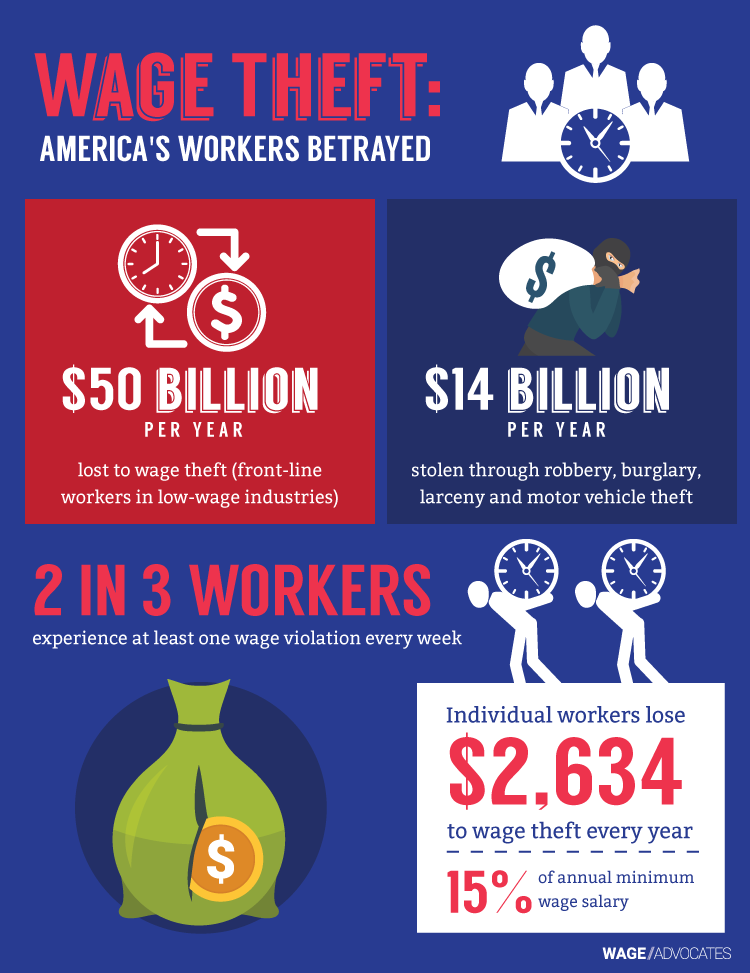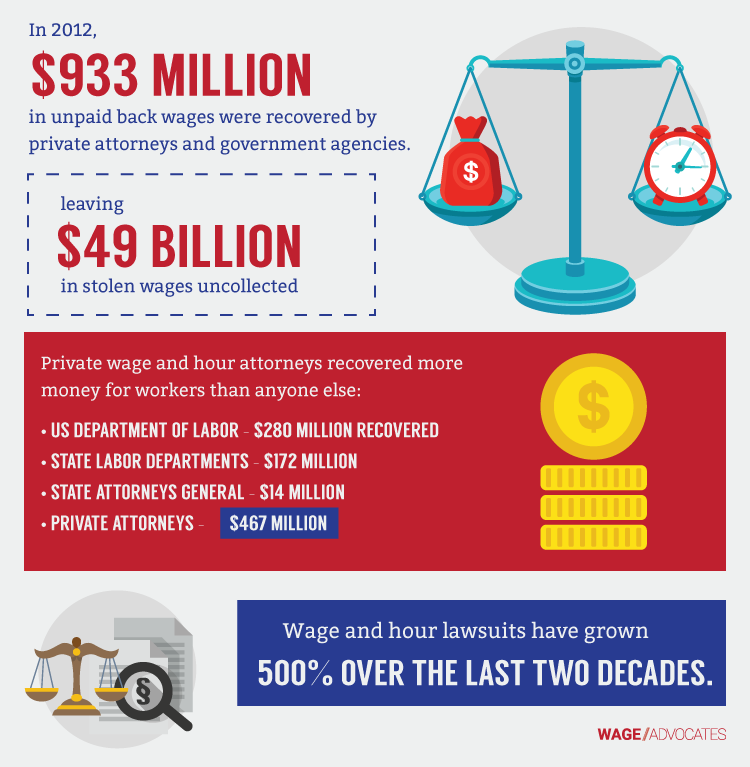When your legal rights have been violated, you have every right to sue your employer.
That’s why knowing your rights as an American worker is so important. As wage and hour attorneys, we turn to the Fair Labor Standards Act, a sweeping federal law that protects the rights of nearly every employee in the United States. The Fair Labor Standards Act, or FLSA, explains how employers should track worker hours, prohibits child labor and entitles eligible employees to a minimum wage and overtime pay.
When Can I File A Wage & Hour Violation Lawsuit?
Most employees in this country have a legal right to be paid at least the minimum wage of $7.25 per hour and time-and-a-half for any hours worked over 40 in a week.
- FEDERAL MINIMUM WAGE: $7.25 per hour
- OVERTIME: Time-and-a-half for all hours worked over 40 in a week
If your employer has failed to honor those rights, the FLSA gives you the power to sue them in a civil lawsuit. But no one is going to do it for you. Enforcing wage and hour laws is up to individual employees; unless you speak out, the problem won’t go away.

7 Reasons To Pursue Back Pay In A Civil Lawsuit
Most wage violations are surprisingly simple: workers just aren’t being paid as much as they should be under federal law. There are complex scams that some employers use to circumvent the law, like averaging workweeks, but more often than not
- You aren’t being paid the minimum wage (if the state minimum wage is higher than or equal to the federal, you can sue under both laws)
- You aren’t being paid “premium” wages for overtime, but work more than 40 hours in a week
- You’re being paid overtime, but not at the correct rate
- You aren’t being paid for all the hours you work, including work you do before or after a shift, or when your breaks are interrupted
- You’ve been told you’re “exempt” and thus not entitled to overtime, but you are
- You’ve been denied overtime because you were “inefficient and needed extra time to finish a job.” That’s a lie. You deserve to be paid for every hour you work.
- You’re not getting paid at all
Here’s another reason: wage and hour violations affect everyone in the work place, not just you. When no one stands up for their rights, it’s easier for an employer to exploit everybody.
How Much Back Pay Can I Win?
That depends on how much has been stolen from you.
For successful wage and hour claims, the FLSA says that employers have to repay all the wages that went unpaid.
Then there’s “liquidated damages,” a sum equal to those unpaid wages. If the court finds that your employer failed to pay you minimum wage or overtime, it can award you both unpaid wages and liquidated wages – double the wages you are owed.
But your employer may be able to get out of paying the liquidated damages, by proving they violated the FLSA accidentally, that they had every intention of paying you properly but just made a mistake. In that case, you’d still get the unpaid wages portion, it just wouldn’t be doubled.

Courts often include damages to cover your attorney fees and court costs, too. In addition, punitive damages, as a way of punishing your employer, may be available if you can prove that they fired you in retaliation for filing your lawsuit, but this is controversial.
Can I Get Fired?
Yes, you can.
Employment in the US is “at-will,” which means anyone can work for anyone else as long as everybody’s happy. Once one party becomes unhappy, they can walk away from the relationship, no questions asked. Employers (usually) don’t need a good reason to fire someone. Montana is a notable exception. Under the state’s “Wrongful Discharge from Employment Act,” private employers need a good reason for firing someone in most cases.
However, employers cannot fire someone for a bad reason. No matter where you live, firing someone because they’ve filed a wage and hour lawsuit is considered “retaliation,” which is specifically forbidden by the FLSA.
Can I Sue My Employer For Firing Me?
In the event that you are fired, and believe that you were fired because you filed a wage violation claim, you have the option of filing a second lawsuit against your employer.
Can I Sue My Boss?
Possibly, and that possibility distinguishes the FLSA from other labor laws.
In addition to suing your employer, which may be a company, an abstract legal entity, you may be able to file suit against your supervisor or boss. Since your supervisor or boss may have just as much control over your employment, hours and wages as anyone else at the company, it’s quite possible that they should be held liable for wage and hour violations.
There’s a four-step test to knowing whether or not an individual, rather than a business, can be sued under the FLSA:
- They have power over personnel decisions, like hiring and firing
- They control in a meaningful way scheduling or the conditions of employment
- They determine how and how much employees get paid
- They keep the employment records
None of these steps are “dispositive,” which means that you may still be able to file a lawsuit against your boss, even if he or she doesn’t satisfy all 4 together.
How Do I Learn More?
Contact an experienced attorney.
This is your right, and since the wage and hour lawyers at WageAdvocates.com offer a free consultation, you have nothing to lose.
Learn more about your legal rights and discuss your own situation today.
Thank you! It was such a relief to know that Wage Advocates were working hard to get me compensation for my unpaid overtime."Rating: 5.0 ★★★★★
